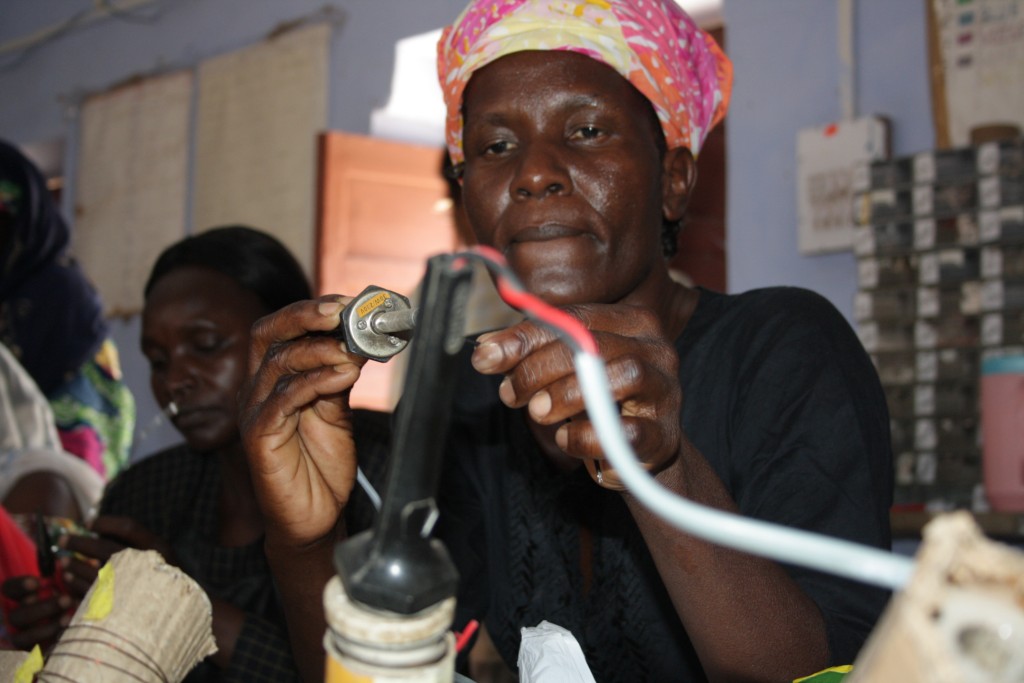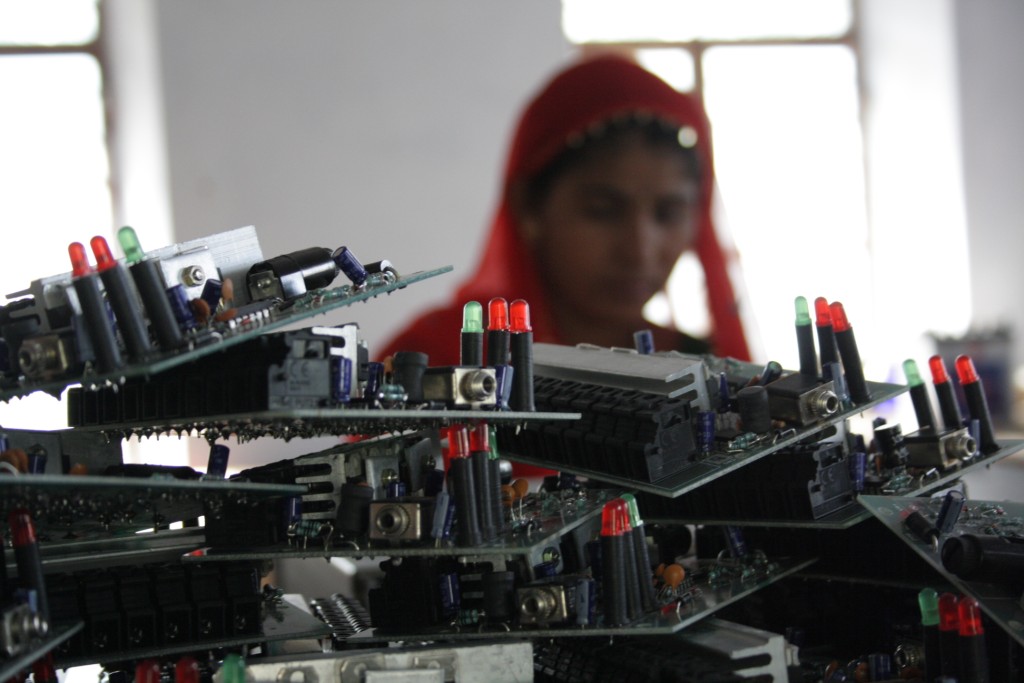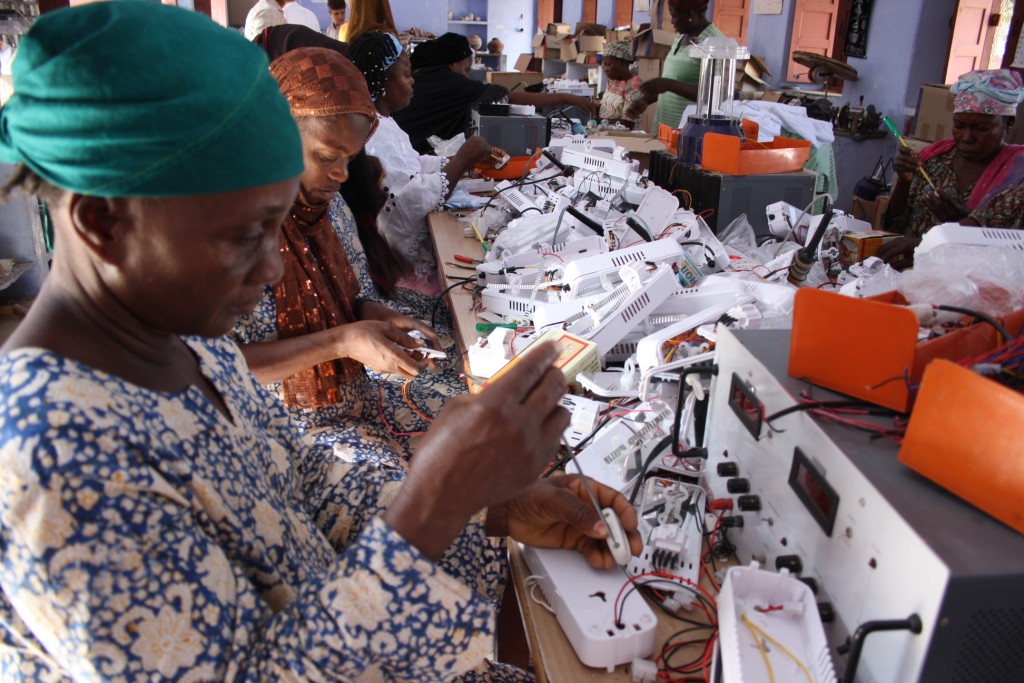

The sky is the limit: Sierra Leone’s ‘barefoot’ women solar engineers
05 March 2021 Leisa Burrell

By Leisa Burrell
Pictures by Barefoot Photographers of Tilonia
An initiative that started 50 years ago in India in a bid to empower rural, illiterate women has now spread to ninety-three countries around the world. The ‘Barefoot’ Solar engineers of Sierra Leone, supported by the United Nations Industrial Development Organization (UNIDO), and funded by the Global Environment Facility (GEF), found themselves in the spotlight during an official visit to Sierra Leone by Amina J. Mohammed, the United Nations Deputy Secretary-General. Mohammed’s visit, at the end of 2020, helped shine a light on the project that has been equipping rural women with the means to connect their communities to solar energy since 2010.
The ‘Barefoot’ women, from India to Africa
The ‘Barefoot story’ is an engrossing tale: women battling the odds to better themselves in order to help their families and their communities by way of solar energy. The first Barefoot College was established in India in 1972 to train illiterate or semi-illiterate women, and to provide them with the basic skills to be solution-providers in their rural communities. As the school’s founder, Bunker Roy, explained in his 2011 TEDTalk, Learning from a barefoot movement: “There are only two rules for enrolment – you must be poor to attend and you must take your learning home to your village.”
Barefoot College training enables participants to support their families and help communities to become more self-sufficient in a range of areas, including education, and health care. One programme, which has been running since 2004, teaches solar engineering skills to illiterate, older women from rural communities – a particularly vulnerable group worldwide, before equipping them with solar lamp kits to assemble and install in their own and in neighbouring villages. Any woman over the age of thirty-five, from a remote, inaccessible, non-electrified area can enrol for the course, provided she is backed by her village.
Not being able to read or write is not an obstacle to learning for the trainees as the College’s courses are designed to enable them to learn through listening and memorizing, using colour-coded charts that help them to remember the arrangement and combination of wires.
Introducing the Barefoot Women of Sierra Leone
The West African country of Sierra Leone, has been described as possessing “everything that a traveller could desire: pristine and almost uninhabited beaches; elephants, hippos, pygmy hippos, crocs and, reportedly, even lions”.
Despite its natural beauty, which, prior to the COVID-19 pandemic, saw it becoming an increasingly popular tourism destination, it is a country that is still grappling with the legacy of its decade-long civil war, which ended in 2002. The country remains poor, ranking low in both gender equality and energy access. In the latter category, Sierra Leone has one of the world’s lowest rates of modern energy access, with only 15 percent of the total population having access to electricity, and just two per cent of those in rural areas.
Sierra Leone’s first cohort of solar engineers came from humble beginnings, but in 2010 they travelled 6,000 miles to train at the Barefoot College in Tilonia, Rajasthan, in western India. After six months of training, they returned to their country to establish the Barefoot Women Solar Engineers Association of Sierra Leone (BWSEASL, commonly known as the Barefoot College), located in Konta Line, Lower Koya in Port Loko District.


Proving their ‘Barefoot’ mettle with UNIDO’s support
In 2012, UNIDO, with funding from the GEF, undertook an initiative to develop sustainable solutions for the supply of energy in Sierra Leone. The Organization sees using renewable energy technologies for productive purposes as a way to achieve the goal of reducing poverty. One aspect of this intervention is to strengthen the capacity of the women training at the Barefoot College.
Graduates from the College not only electrify their own homes but also provide indoor solar lights and solar PV-powered water pumps to other homes and facilities, like schools and community clinics. Communities pay a monthly contribution for the repair and maintenance of the solar units. This is done through Village Solar Committees that implement, supervise and administer projects in their villages.
Speaking about the impact of Sierra Leone’s Barefoot Women, UNIDO’s Country Representative, Mariatu Swaray, explained that “thirty-three towns and villages have been provided with partial electricity, totalling around 2,950 solar PV systems. Solar electrification has also been provided to the twelve villages where the twelve India-trained Barefoot Women originate from.”
Moreover, she said, “They have provided solar electrification to all the police stations, police posts and houses of worship within their training community, as well as repairing solar cold chains in Port Loko District. The Barefoot Women have also installed solar pumps that help harvest water from wells into tanks - helping clinics access water - and solar panels at hospitals.”
“With UNIDO’s support, the Barefoot College now has the capacity to not only train ordinary women on the installation and maintenance of solar PV systems, but also to provide them with training on ICT, greenhouse technology, soap-making, tailoring, woodwork and upholstery, as well as welding skills for use in producing solar energy,” said Swaray.
Haja Nancy Kanu, Chief Solar Engineer for the Barefoot Women, said that “although most of the women with the organization did not go to school, they have been helping graduates and others in the universities to learn about the technical aspects of solar energy.” She added that one could “not talk about solar engineering in Sierra Leone without mentioning the Barefoot Women.”
Amina J. Mohammed’s visit to Sierra Leone and the Barefoot Women

Attesting to the success of the Barefoot Women and their impact, the Barefoot College received a visit from the Deputy Secretary-General of the United Nations, Amina J. Mohammed, as part of a two-day official visit to Sierra Leone and a broader solidarity mission to West Africa and the Sahel Region towards the end of 2020. Mohammed is the highest-ranking United Nations representative to travel to Sierra Leone since its first reported positive case of COVID-19 in March 2020.
Speaking at the Barefoot College, Mohammed commended the women on being catalysts of change in their rural communities through electrification using solar energy, and for ensuring technology transfer by training around 500 women, men and youth on solar technology.
She noted that, despite the COVID-19 crisis, the “United Nations is committed to accelerating climate action” and that, in this regard, the Secretary-General had “called on countries to invest in renewable energy in COVID-19 recovery plans.”
Commending the Barefoot Women’s plans to expand the project, particularly the electrification of rural clinics, Mohammed also acknowledged their efforts to build the capacity of men, women, and youth; and to diversify into other sectors - agriculture and manufacturing.
From humble beginnings to great heights
Also speaking at the event, UNIDO’s Swaray was full of praise for the College, noting that it offered “a positive path for young people seeking the chance to make something of themselves, and can empower people who have previously been locked out of the existing social order - women and youths, others who are not part of the “old boys” network - giving them a chance to contribute and to lead.”
Starting from just twelve women, there are now hundreds of women that continue to work on solar energy technology for economic activities, empowering women and youth in Sierra Leone.
In concluding her speech, Mohammed commended the women of the Barefoot College on their initiative, remarking that the Barefoot Women “have just shown us that the sky is the limit and they can do better when given opportunities.”